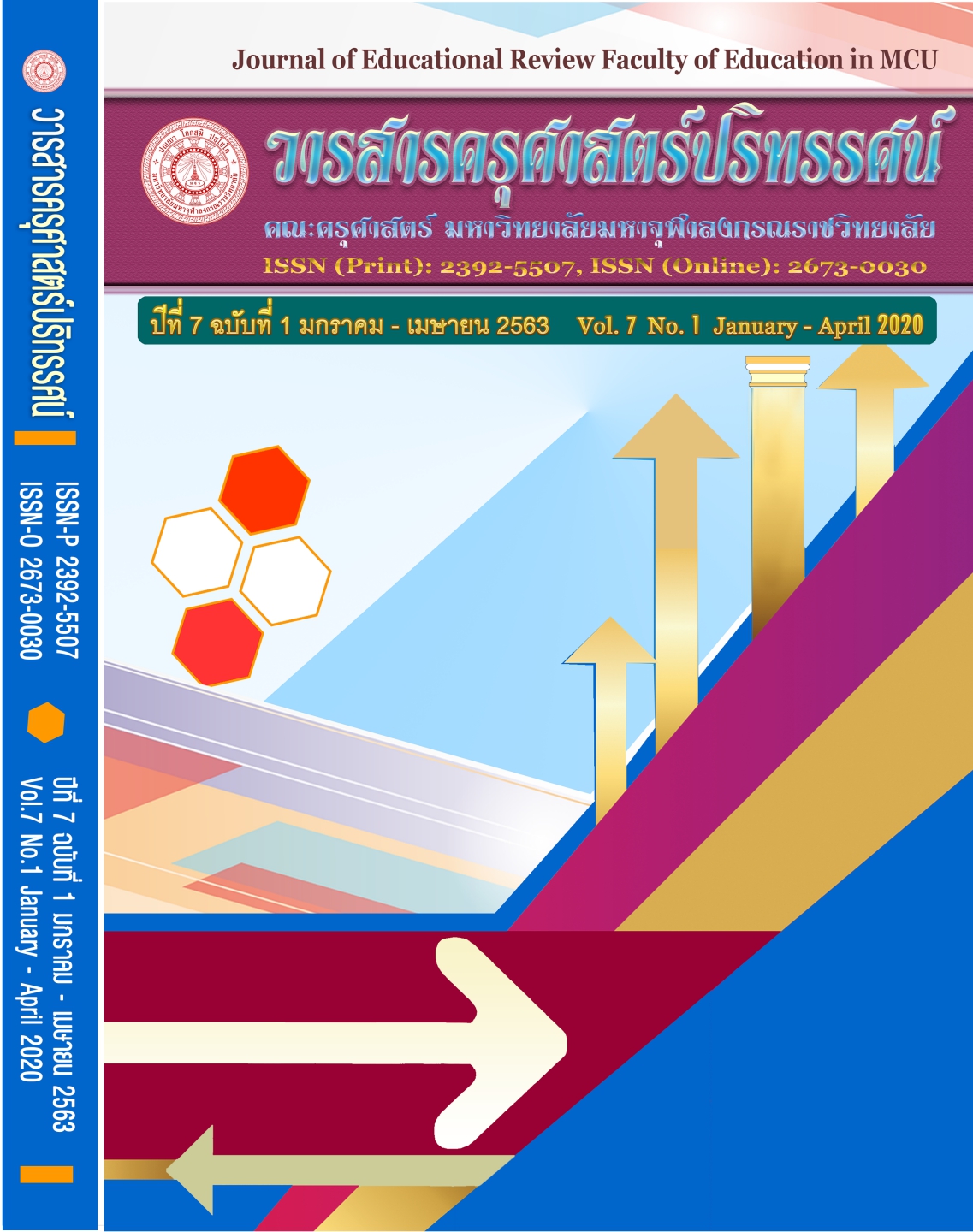DEVELOPMENT OF LEARNING MANAGEMENT OF DHAMMA STUDY IN ACCORDANCE WITH IDDHIPÃDA 4 OF SECONDARY SCHOOLS
Main Article Content
Abstract
The purpose of this research paper is to propose the development of the Dhamma Study Teaching and Learning According to Ithbaht 4 for secondary schools. Mixed research There are 3 steps of research which are step 1: study the conditions of the teaching and learning management of Dharma education Questionnaires were used by 400 secondary school students. Data were analyzed using descriptive statistics such as frequency, percentage, mean and standard deviation. Step 2 The development of teaching and learning in Dhamma education according to the power of virtue 4 with data interview. Important 22 people with an interview form Data was analyzed by content analysis. And step 3, propose the development by group discussion of 17 experts with questions for group discussion Data was analyzed by content analysis. The conclusion of the research shows that The Development of Dhamma Education Instruction According to Ithbaht 4 for Secondary Schools To achieve success, there are 3 important principles, consisting of 1) The teaching and learning of Dharma education should be the collaboration between the administrators, teachers, school directors, monks, parents, students and the community. 2) The teaching and learning of Dharma education should Increasing participation in 4 areas: content and teaching methods General management Teachers Facilities management 3) All stakeholders have participated in the school development. By integrating the principles of Dharma education with 4 principles of the Dharma with patience, diligence, concentration, and using intelligence to investigate. In summary, the research body is LID.
Article Details
ทัศนะและความคิดเห็นที่ปรากฏในบทความในวารสารฉบับนี้ถือเป็นความรับผิดชอบของผู้เขียนบทความนั้นเพียงผู้เดียว และไม่ถือเป็นทัศนะและความรับผิดชอบของกองบรรณาธิการ
กองบรรณาธิการขอสงวนสิทธิ์ในการคัดเลือกบทความลงตีพิมพ์และจะแจ้งให้เจ้าของบทความทราบหลังจากผู้ประเมินบทความตรวจอ่านบทความแล้ว
ต้นฉบับที่ได้รับการตีพิมพ์ในวารสารครุศาสตร์ปริทรรศน์ คณะครุศาสตร์ มหาวิทยาลัยมหาจุฬาลงกรณราชวิทยาลัย ถือเป็นกรรมสิทธิ์ของคณะครุศาสตร์ มหาวิทยาลัยมหาจุฬาลงกรณราชวิทยาลัย ห้ามนำข้อความทั้งหมดหรือบางส่วนไปพิมพ์ซ้ำ เว้นเสียแต่ว่าจะได้รับอนุญาตจากมหาวิทยาลัยฯ เป็นลายลักษณ์อักษร
References
กรมการศาสนา. (2550). คู่มือดำเนินงานตามโครงการครูพระสอนศีลธรรมในโรงเรียน. กรุงเทพมหานคร: กระทรวงวัฒนธรรม.
กระทรวงศึกษาธิการ. (2562). พระราชบัญญัติการศึกษาแห่งชาติ พ.ศ. 2562. กรุงเทพมหานคร: โรงพิมพ์คุรุสภา.
กัญญลักษณ์ จันทรวิบูลย์, สมศักดิ์ บุญปู่, พระมหาญาณวัฒน์ ฐิตวฑฺฒโน. (2562). แนวทางส่งเสริมการบริหารงานวิชาการตามหลักอิทธิบาท 4 สำหรับโรงเรียนเตรียมอุดมศึกษาพัฒนาการ นนทบุรี. วารสารครุศาสตร์ปริทรรศน์ คณะครุศาสตร์ มหาวิทยาลัยมหาจุฬาลงกรณราชวิทยาลัย. 6(1). 59-70.
ชัยยงค์ พรหมวงค์. (2551). เอกสารประกอบการพัฒนาหลักสูตรและสื่อการเรียนการสอน. กรุงเทพมหานคร: โรงพิมพ์มหาวิทยาลัยสุโขทัยธรรมาธิราช.
ธานินทร์ ศิลป์จารุ. (2552). การวิจัยและวิเคราะห์ข้อมูลทางสถิติด้วย SPSS. พิมพ์ครั้งที่ 10. กรุงเทพมหานคร: บิสซิเนสอาร์แอนด์ดี.
ธีระพร อายุวัฒน์. (2552) แนวปฏิบัติที่เป็นเลิศในการบริหารงานวิชาการของสถานศึกษาขั้นพื้นฐานขนาดเล็ก. ดุษฎีนิพนธ์ปรัชญาดุษฎีบัณฑิต. มหาวิทยาลัยศิลปากร.
บุญชม ศรีสะอาด. (2558). วิจัยเบื้องต้น. กรุงเทพมหานคร: สุวีริยาสาส์นการพิมพ์.
ประภาสี สีหอำไพ. (2553). พื้นฐานการศึกษาทางศาสนาและจริยธรรม. กรุงเทพมหานคร: จุฬาลงกรณ์มหาวิทยาลัย.
ปิ่น มุทุกันต์. (2518). บันทึกธรรม ฉบับสมบูรณ์. พิมพ์ครั้งที่ 5. กรุงเทพมหานคร: คลังวิทยา.
พระพรหมคุณาภรณ์ (ป.อ.ปยุตโต). (2549). พุทธธรรม ฉบับปรับปรุงและขยายความ. พิมพ์ครั้งที่ 11. กรุงเทพมหานคร: สหธรรมิก.
มหาวิทยาลัยจุฬาลงกรณราชวิทยาลัย. (2539). พระไตรปิฎกฉบับภาษาไทย ฉบับจุฬาลงกรณราชวิทยาลัย. กรุงเทพมหานคร: โรงพิมพ์มหาจุฬาลงกรณราชวิทยาลัย,.
เมตตา ภิรมย์ภักดิ์. (2548). แนวทางการดำเนินงานโรงเรียนวิถีพุทธ. กรุงเทพมหานคร: สาระไทย.
วรวิทย์ วศินสรากร. (2550). คนกับการศึกษา. กรุงเทพมหานคร: ธนธัชการพิมพ์.
วัฒนาพร ระงับทุกข์. (2551). การจัดการเรียนการสอนที่เน้นผู้เรียนเป็นศูนย์กลาง. พิมพ์ครั้งที่ 2. กรุงเทพมหานคร: เลิฟแอนด์ลิพเพรส.
ศุภลักษณ์ เศษธะพานิช. (2550). การพัฒนาระบบการบริหารที่มุ่งเน้นความเป็นเลิศของสถานศึกษาเอกชน. ดุษฎีนิพนธ์ครุศาสตรดุษฎีบัณฑิต. จุฬาลงกรณ์มหาวิทยาลัย.
สงบ ลักษณะ. (2552). การวิจัยหลักสูตรและกระบวนการเรียนการสอน. นนทบุรี: มหาวิทยาลัยสุโขทัยธรรมาธิราช.
Lethwood K., Leonard L. and Sharratt L. (1998). Conditions Fostering Organizational Learning in School. Education Administration Quarterly. 34.
Sallis E. and Jones G. (2002). Knowledge Management in Education. London: Kogan page.
Wicklund D. (2003). Individust learning versus cooperative learning in a University Spreadsheet Application Class. Dissertation Abstracts International, 63(10).


